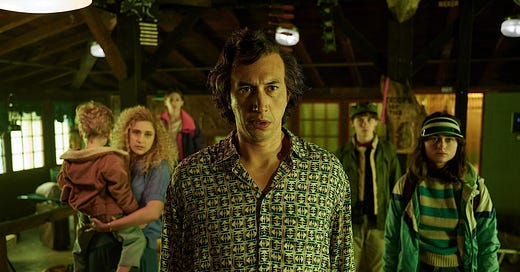White Noise (2022)
Written and directed by Noah Baumbach
This movie kind of came and went last year without a splash, though I expected one. Major book by a famous author; starring role by Adam Driver, one of the biggest actors of the last decade. But come to think of it, Don DeLillo, whose book provides the film's story and dominant mood, is well-known for dialogue that is intentionally obscure, and sets each speaker against the other even when they're agreeing with one another. It's anti-naturalistic even though, or because, it uses banal and cliched expressions, the better to satirize the characters. So even though the dialogue in this film has the rapid-fire pace of "The Front Page," it is much harder to follow. This might be one reason why the film seemed to rapidly fade from the world. Another might be the merciless way it skewers its characters and their intentionally typical middlebrow attitudes and American lifestyle. Just to take one example, this year's "Joy Ride," a madcap comedy that sometimes approaches Seth Rogen gross-out, actually loves its characters and doesn't miss offering them grace at the end. Don DeLillo would not recognize grace if he was mercy-fucked by the Holy Spirit herself.
And yet, after an hour of wild farce and black humor filled with empty dialogue and spooky/farcical events, Act 2 of the film runs hard into a genuinely emotional scene and accompanies it with the kind of swelling music you'd expect in any movie when the characters cry. We sympathize with Babette (Greta Gerwig) as she is bullied by her husband Jack (Driver) into admitting that exchanged sex for several months with a project manager of a pharmaceutical company for access to an experimental drug called Dylar. She sobs, the music sobs. For a few minutes we're in an ordinary romantic drama. Then the scene dissolves into banter between Jack's fellow faculty members at the college where he is the program director of Hitler Studies; they're mouthing profound-sounding but meaningless, and in any case inhumane, things about death.
Chief -- or at least most heard from -- among these colleagues is Murray, played in another full-bodied transformation by the chameleonic Don Cheadle in a black power beard and a "white voice." He seems to be a media studies professor -- he hypnotizes students with a car crash compilation video, and loves to talk compulsively about Elvis Presley and what he signifies. The college is a place not of learning or even teaching, but a stage for narcissistic monologues by the faculty. Students wearing brightly colored polo shirts dutifully take notes, participating in the charade, the point of which seems to be to render language meaningless. (Some would say this deed has already been done by the postmodernists.) But Murray isn't just another word twister. He is a real friend to Jack: when Jack demands Murray's car keys for a sinister errand, Murray hands them over without needing an explanation.
Babette took the experimental drug because she -- on the surface a cheerful mother in a modern American family (of their marriage, Jack explains to a colleague "we're each other's fourth") -- is increasingly, and for no apparent reason, fearful of death. Typically for a man, Jack has to one-up her. He's the one who should be fearful of death, since being exposed in a previous sequence to toxic chemicals. He has only two choices -- to take Dylar, or to kill its source, the man who raped his wife. "Men are killers," Babette prophecies, and the film leads Jack to this choice. He shoots the drug man (Lars Eidinger) in a tense set piece that dissolves once again into farce; in fact farce is the default setting in this story about death-entangled characters, and keeps both elements in the foreground more effectively than "Love and Death" or any other film by Woody Allen, who would eat his heart out if he ever saw this.
The principal set piece is the Airborne Toxic Event, a rubric that covers a train derailment and the panicked evacuation that ensues. Baumbach has fun here evoking "Close Encounters of the Third Kind" in a dozen different ways, from a station wagon fishtailing into garbage cans as it peels off down a suburban street, to huge crowd scenes during the evacuation, to an enormous cloud full of lightning and something even scarier. Another stage for farce is a huge supermarket that appears to have been stocked by Andy Warhol, with PA announcements by an absurdist poet.
The performances by Driver and Gerwig are very good, though she has a lot less to work with, as Adam Driver is in almost every scene. I think they made the wrong choice with her hair, which is basically a poodle cut and overwhelms her face, which is her primary tool as an actor. The young actors who play the children fit perfectly in the rapid overlapping dialogue. Keep an eye on Raffey Cassidy, who plays the older girl; she has presence, and has already starred in a couple of films.
But for all this pleasure, the best of which are Baumbach's confident directorial choices, the movie is weighed down, not by the focus on death but all the empty dialogue. That's Baumbach's worst choice, but it would hardly be a film of the DeLillo novel without it.





